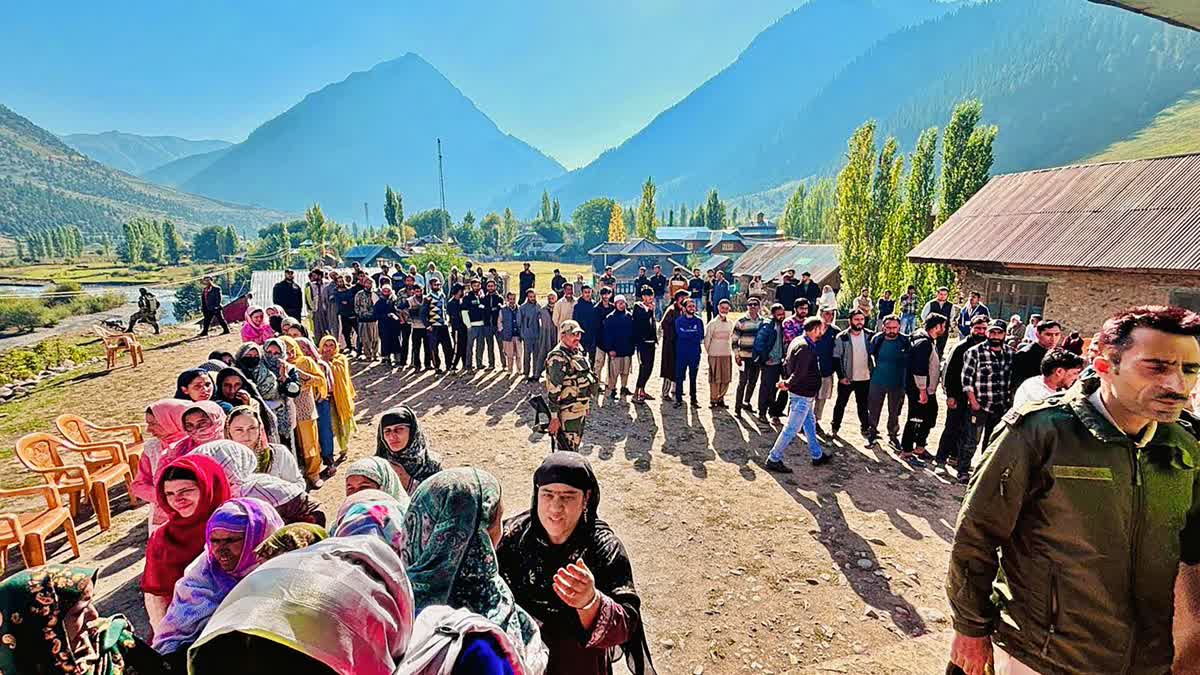Srinagar: With the three phased legislative assembly election after a hiatus of 10-long years over in Jammu and Kashmir, the focus has shifted to the five nominated members as they have a direct bearing on the electoral outcome.
As the Lieutenant Governor (LG) can choose the nominees to the House without consulting the Chief Minister or the elected government of the union territory, this will revise the magic number required to form the government.
The J&K Reorganisation Act section 15 allows the governor to nominate two women members to the Legislative Assembly if the women are not adequately represented in the Legislative Assembly. The provision was retained from the erstwhile J&K state constitution in which the Governor was to make the nomination but on the recommendation of the elected government. The rest include members from Kashmiri migrants (Kashmiri Pandits) and Pakistan-occupied Jammu and Kashmir (PoJK) refugees. Their nomination to the legislative assembly was paved through an amendment cleared in the Parliament in December last year, taking the total tally of assembly to 95.
The process
The nomination process mimics Puducherry where the LG can recommend three MLAs to the assembly. The move of inducting members by Puducherry then LG Kiran Bedi without consulting the Congress led government was challenged in Madras High Court and later in the Supreme Court in 2017-2018. The ground of challenging the nomination was that the Centre did not consult the state government before nominating the MLAs. But the top court upheld it and found no illegality in it.
The voting rights
The recently concluded election which saw a 64 per cent voter turnout were held for 90 seats comprising 43 in Jammu and 47 in Kashmir. But the five nominated members are also entitled to have voting rights on par with the elected members on all matters including no-confidence motion can be crucial for the government formation.
LG's discretion
Former J&K Law Secretary Mohammad Ashraf Mir says the LG can nominate the five members before the government formation. The J&K reorganisation allows the LG, who represents the centre, to nominate them without the advice of the elected government, making the chances of the ruling Bharatiya Janata Party brighter.
The nomination of two women to the House has been retained from the erstwhile J&K constitution but with a change. Like in the previous legislative assembly in 2014, two women were nominated to the 87-member legislative assembly on the recommendations of the government. “But the J&K reorganisation allows the LG to take the decision without the aid and advice of the elected government. Hence, it is his discretion to nominate them before the formation of government. Their votes will count in the government formation,” adds Mir, who also served as state information commissioner after retirement until the erstwhile state was stripped of its statehood.
House composition
With these five nominations, the total number of seats in the assembly has increased to 119 including 24 vacant seats of Pakistan occupied Kashmir (PoK). If the nominees are announced and sworn in before the government was formed, then the requisite number to form the government will go up to 48 from 46.
The delimitation commission which fixed territorial boundaries of the assembly countries in Jammu and Kashmir gave six additional seats to Jammu and one to Kashmir. This almost brought the two regions on par with each other, realising the long pending demand of the BJP to end the Valley domination in the government. Until now, only former veteran congress leader Ghulam Nabi Azad hailing from Jammu’s Doda held chief ministership.
But this time, the BJP is keen on electing Hindu Chief Minister from Jammu if they cross the majority mark. While the Opposition is not averse to their chief ministership but it is the nomination of members by the LG which has peeved them describing the provision as ‘constitutional rigging’.
Opposition's worry & BJP's response
“The provision has been issued to marginalise the opposition,” says Congress J&K state president Tariq Hameed Karra. They apprehend the government can use these five nominated members to turn the majority into a minority, he added. “In Rajya Sabha, the members are nominated by the President of India on the recommendation of the cabinet. But here, they have brought an arbitrary provision where the elected government will have no right to nominate the members.”
According to him, the deliberations for nomination are underway and the names have been almost readied. “They are just waiting for the results to declare these five persons. But this is an arbitrary provision and constitutional way of rigging,” he adds.
But senior BJP leader and former deputy chief minister Kavinder Gupta terms the Opposition’s charges as their ‘frustration’ in the face of their impending defeat in the polls. “These members will be nominated as per the rules,” he says. “The LG has discretion to nominate them and he will do it according to the rules.”
Read More



